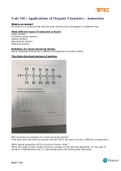Isomerism - Study guides, Class notes & Summaries
Looking for the best study guides, study notes and summaries about Isomerism? On this page you'll find 431 study documents about Isomerism.
Page 4 out of 431 results
Sort by
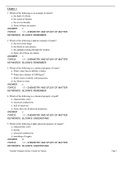
-
Test Bank for Introduction to General, Organic and Biochemistry, 12th Edition by Bettelheim
- Exam (elaborations) • 928 pages • 2022
-
- $39.99
- 11x sold
- + learn more
Test Bank for Introduction to General, Organic and Biochemistry 12e 12th Edition by Frederick A. Bettelheim; William H. Brown; Mary K. Campbell; Shawn O. Farrell; Omar Torres. ISBN-13: 1594 Full Chapters test bank Chapter 1: Matter, Energy, and Measurement 1.1 Chemistry and the Study of Matter 1.2 The Scientific Method 1.3 Reporting Numbers in Science 1.4 Making Measurements 1.5 Unit Conversions 1.6 States of Matter 1.7 Density and Specific Gravity 1.8 Describing the Various For...
Essay Unit 14C - Applications of Organic Chemistry - isomerism
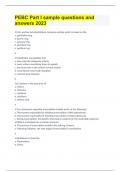
-
PEBC Part I sample questions and answers 2023
- Exam (elaborations) • 25 pages • 2023
-
Available in package deal
-
- $12.49
- + learn more
1 Folic acid has tetrahydrofolate coenzyme activity which is based on the: a. pyrimidine ring. b. purine ring. c. pyrazine ring. d. pteridine ring. e. pyridine ring. d 2 Enkephalins are peptides that: a. have narcotic antagonist activity. b. exert actions resembling those of opioids. c. are found only in the central nervous system. d. cause blood vessel wall relaxation. e. transmit pain impulses. b 3 β-Carotene is the precursor of: a. retinol. b. thiamine. c. calciferol...
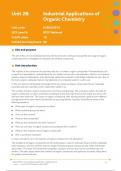
-
Industrial Applications of Organic Chemistry
- Exam (elaborations) • 14 pages • 2024
-
- $8.99
- + learn more
Unit 28: Industrial Applications of Organic Chemistry Unit code: H/502/5573 QCF Level 3: BTEC National Credit value: 10 Guided learning hours: 60 Aim and purpose The aim of this unit is to familiarise learners with the structure, naming and properties of a range of organic compounds and to investigate the industrial uses of these compounds. Unit introduction The majority of the substances we use every day are, or contain, organic compounds. Pharmaceuticals such as aspirin and parac...
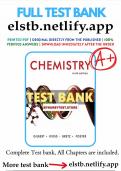
-
THE Test Bank for Chemistry 6th Edition Gilbert
- Exam (elaborations) • 140 pages • 2024
-
- $13.49
- + learn more
W. W. Norton & Company has been independent since its founding in 1923, when William Warder Norton and Mary D. Herter Norton first published lectures delivered at the People’s Institute, the adult education division of New York City’s Cooper Union. The firm soon expanded its program beyond the Institute, publishing books by celebrated academics from America and abroad. By midcentury, the two major pillars of Norton’s publishing program—trade books and college texts—were firmly estab...
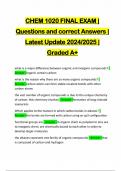
-
CHEM 1020 FINAL EXAM | Questions and correct Answers | Latest Update 2024/2025 | Graded A+
- Exam (elaborations) • 17 pages • 2024
- Available in package deal
-
- $12.29
- + learn more
CHEM 1020 FINAL EXAM | Questions and correct Answers | Latest Update 2024/2025 | Graded A+ what is a major difference between organic and inorganic compounds? - Answer -organic contain carbon what is the reason why there are so many organic compounds? - Answer -carbon atoms can form stable covalent bonds with other carbon atoms the vast number of organic compounds is due to the unique chemistry of carbon. this chemistry involves - Answer -formation of long chains& isomerism Which app...
Essay Unit 14C: Applications of Organic Chemistry: isomerism
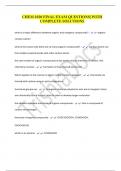
-
CHEM 1020 FINAL EXAM QUESTIONS| WITH COMPLETE SOLUTIONS
- Exam (elaborations) • 17 pages • 2024
-
- $9.99
- + learn more
CHEM 1020 FINAL EXAM QUESTIONS| WITH COMPLETE SOLUTIONS what is a major difference between organic and inorganic compounds? - -organic contain carbon what is the reason why there are so many organic compounds? - -carbon atoms can form stable covalent bonds with other carbon atoms the vast number of organic compounds is due to the unique chemistry of carbon. this chemistry involves - -formation of long chains& isomerism Which applies to the manner in which carbon bonds in alkanes? - -the ...
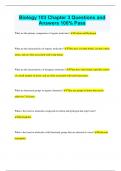
-
Biology 103 Chapter 3 Questions and Answers 100% Pass
- Exam (elaborations) • 8 pages • 2024
- Available in package deal
-
- $9.99
- + learn more
Biology 103 Chapter 3 Questions and Answers 100% Pass What are the primary components of organic molecules? Carbon and Hydrogen What are the characteristics of organic molecules? They have covalent bonds, can have many atoms, and are often associated with living things. What are the characteristics of inorganic molecules? They have ionic bonds, typically consist of a small number of atoms, and are often associated with nonliving matter. What are functional groups in organic chem...

How much did you already spend on Stuvia? Imagine there are plenty more of you out there paying for study notes, but this time YOU are the seller. Ka-ching! Discover all about earning on Stuvia

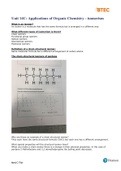


![AQA A-level CHEMISTRY 7405/1 Paper 1 Inorganic and Physical Chemistry Version: 1.0 Final *JUN237405101* IB/M/Jun23/E9 7405/1QUESTION PAPER & MARKING SCHEME/ [MERGED] Marl( scheme June 2023](/docpics/4426917/65c0f4fd8496f_4426917_121_171.jpeg)
